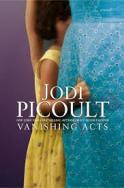When Mothers Have Other Priorities
- Jann Alexander

- May 16, 2015
- 6 min read
When a sudden virus kept me sidelined on Mother’s Day and for a few days thereafter, I turned to the only antidote that relieved my symptoms: reading. I started in on the stack on my nightstand and on my iPad, and by coincidence, I thought then, their themes were all about mothers and daughters. Later I realized I’d been given a unique Mother’s Day gift—not as good as the unexpected bouquet of flowers my son brought to my bedside, of course—but still, my illness had given me uninterrupted time to contemplate the many ways mothers’ priorities can go astray, despite their best intentions.
Just before my enforced bed rest, I was finishing up The Heiress of Water. There are books that grab you and soak you in their world, and reluctantly let you go when you’re finished, and this was just one of those books. Its mother and daughter theme of lost-and-found had been central to that pull.
Alma Borrero Winters believed that everything in life begins and ends with the ocean. —The Heiress of Water, by Sandra Rodriguez Barron
So reads the first sentence of The Heiress of Water, Sandra Rodriguez Barron’s remarkable first novel, where a mother’s priorities are atypical. They include her lifelong obsession with ocean creatures possessing curative powers, the cone snails, and her self-destructive passion for a man who is not her husband and not from her class (a significant divide in Alma’s El Salvador), as her daughter Monica will discover over time, causing her to question the priority she held in her mother’s life.
I never questioned my priority in my own mother’s life. After all, I was her firstborn. It was only when I became a mother that I began to suspect that her four children—all born in less than six years—may have given her little choice. When my parents’ honeymoon baby was born to my mother at age 21, I was the first she’d have on her path to alleviate the loneliness she felt as a single child, a blessed surprise born late in life to an older woman (in her forties) who would herself become a widow in a dozen years.

At the Lake My mother and I match waves, with my next sister and brother | Jann Alexander ©2015
Two days compete for the worst in my life: The first is the day I was taken from my mother; the second is the day I arrived at the Mosses’ foster home four years later. —Three Little Words, by Ashley Rhodes-Courter
When a mother’s priority is getting high, as Ashley Rhodes-Courter would learn the hard way at age three, there is no substitute for mother love. After her nine-year ordeal in foster care, with over a dozen “so-called mothers” and even more unkept promises from her own mother, this daughter still yearns for the one who birthed her and always called her Sunshine. Rhodes-Courter’s memoir, Three Little Words, written when she was 22, details the painful journey she made to let go of her childhood magical thinking.
Did my own mother engage in magical thinking? Perhaps so, because in quick succession, my sister arrived—within the same year as I had—she in December, where I’d been their January child. There are family photographs from that next year, of my mother with us, the sockets below her eyes so dark she looks haunted. She may have been, having two babies within 11 months and each one unexpected, since she and my father practiced the only allowable Catholic method of birth control in the 1950s: rhythm. Talk about magical thinking.
Moments after receiving the worst news of my life, I drive into the middle of a massacre. —Larger Than Life, by Jodi Picoult
Maternal priorities are more evident among elephants than humans, a lesson Jodi Picoult’s novella, Larger Than Life, etches under Botswana skies. Written as part backstory, part teaser for Picoult’s 2014 novel, Leaving Time, the story follows themes familiar to many a grown child. The maternal push a woman has to fulfill her own unfulfilled dreams through her child leads them both in every which way except right.
If my mother had a career priority, I was never overtly aware of it. She’d played the piano since childhood, and after my brother and my last sister came within the next four years, she had borne her very own piano class. Though we dutifully practiced keys as youngsters, we were far more enchanted with hearing her play ‘Three Little Fishies,‘ as we sang along, than we ever were with learning to play. She taught us until exasperation, and then launched her own piano teaching career in our living room, finding that other peoples’ children were more willing pupils. And more willing to pay to play.
You can’t exist in this world without leaving a piece of yourself behind.
—Vanishing Acts, by Jodi Picoult
A mother whose priority turns out to be alcohol, and a hidden affair, leads to sudden upheaval for 32-year-old Delia in Jodi Picoult’s novel, Vanishing Acts. Even as the stunning revelations that keep assaulting her careful world help Delia make sense of a puzzle she isn’t fully aware she’s piecing together, she finds the guidance she needs to face what may come. Delia’s priorities for her own four-year-old daughter are never unclear; but psyching out her long-lost mother’s priorities lead her to both disappointment and clarity.
I was in high school when I became aware of the regular appearance each afternoon of a rocks glass on the kitchen counter, filled with a clear liquid that possessed more weight than water, poured over ice cubes and adorned with an olive, maybe two. I was a full-fledged drinking adult when I realized the nature of the habit she’d undertaken as she bounced between teaching her piano students, grocery shopping at the commissary, helping her own children after school, starting a garden club, ironing my father’s cotton undershirts and making dinner each night. But our mother was never the kind of alcoholic you’d label as such. She was always fully functional. She never made a scene, or became outrageous. She used it to soothe, what, she never told me—but I never asked—and that much I could understand.

At the Pool My mother with her fourth child, my youngest sister, as we frolic in the water | Jann Alexander ©2015
Our mother performed in starlight. —Swamplandia! by Karen Russell
13-year-old Ava Bigtree’s mother deftly managed dual priorities: as mother to three and caregiver to all, and as the breadwinner with her unlikely career as an alligator wrestler and high diver in the Florida swamps. In Karen Russell’s heralded first book, Swamplandia! it was Ava’s mother, not her father, whose talent supported their family of five, and when she succumbs swiftly to breast cancer, young Ava tries to shoulder her mother’s responsibilities. That takes readers on a wild ride (literally, through the Everglades, in search of ghost lovers, ghost ships and her missing sister) with results almost as crazy as saving the family business by stepping into her mother’s water shoes.
My mother was just 29 when she got the news she had breast cancer. She was the second to know; during a hospital biopsy, she remained under general anesthesia on the operating table as the lab did its work on the dread specimen. My father was waiting nearby, and when he was told the results, he authorized the surgeon to perform the procedure he and my mother had discussed beforehand. When she came out of surgery with a radical mastectomy and all lymph nodes removed (the typical procedure in the 1960s), she had just one breast. But she still had four children at home, all under ten, and the other typical procedure of the era was performed on her six weeks later: a complete hysterectomy. Weren’t four enough?
Who knows if this crushed her dream of a large boisterous family, so unlike the one she grew up in? We were already boisterous, just we four. But somehow she always managed to make each of us feel as though we were her priority. I’d like to think we were; except now I know that motherhood is more complicated than that. A mother is expected (unrealistically?) to have multiple priorities without ever indicating that any one of them might trump motherhood as the top one. She can never have a favorite child (though surely it was me!) and she can never put herself, or her choices, above her children.
None of this stopped my mother from performing, though she was always a more a dedicated pianist than a gifted one. And it only enhanced her proud encouragement of legions of young piano students, who performed in yearly recitals she conducted right up until the week of her death at age 71. ♣
How do you juggle the priorities of motherhood? Any different from your mother?
For more on the art of writing, look HERE.
Click Here to get your free monthly digest of Popular Pairings.












Comments